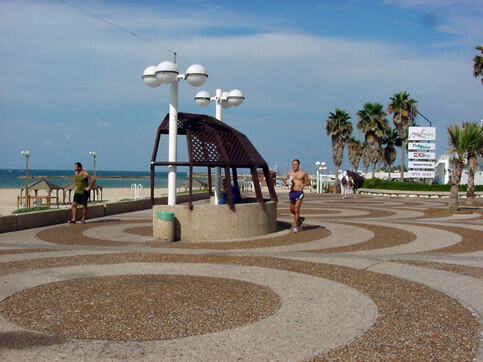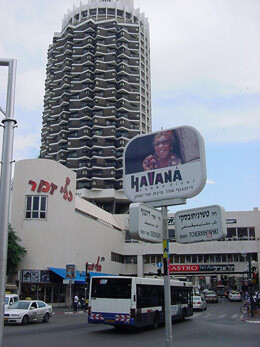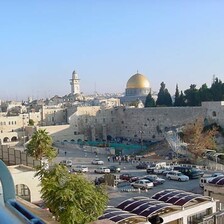
The Tel Aviv beachfront (Bill Dienst)
23 September
Good morning. It is almost 2 am. KLM flight 461 from Amsterdam approaches from the West over the Mediterranean Sea and directly over downtown Tel Aviv. The tires of our aircraft’s wheels screech slightly as we touch down on the tarmac at Ben Gurion airport. The passengers give our pilot a polite applause.
As we disembark, we enter the shiny new airport terminal. We walk down the long marble hallways and then down the ramp towards security/passport control. I feel anxiety swelling up within my chest. I try to meditate and think of something else as I wait my turn to talk with the customs officer. I am dressed in my best “University Professor” outfit: slacks, open collar and sweater, complete with reading glasses hanging down off the end of my nose. As I get closer, I try to get my story straight within my head.
My main reason for being here in Israel-Palestine again for the fourth time is to do free lance photojournalism and further document widespread human rights abuses that Israel commits every day against Palestinians in the West Bank and Gaza; the Israeli government is trying to slowly suffocate them and steal their land, making life so miserable that they will leave.
I can’t tell the Israeli security officer my real reasons for coming here, for if I do, I will be detained. My passport will be stamped “Entry Denied,” and I will be placed on the very next flight back to Amsterdam. More and more, peaceful human rights activists are suffering this fate. Palestinian-Americans are being denied entry all the time. Israel and its supporters in the United States try to control the information flow. Israel does not want the world, and especially the American taxpayers who finance the Jewish state, to know the ugly truth.
So for me, now, it is like playing poker. I could go for the partial bluff and tell them that I will be visiting the West Bank city of Ramallah, and the Palestine Medical Relief Society. This is true, but not the full story. This approach might open up other doors of inquiry that I don’t want to open. I may then be just enough above the radar screen to invite the second round of questioning and interrogation, which might just get me into deeper doo-doo. If they Google me, and find out what I have written, photographed and posted on internet websites based on previous trips, then I may be fucked.
Now it is my turn. A beautiful young Israeli security officer beckons me. I make direct eye contact and smile as I approach. I decide to go for the full bluff.
“Why are you coming to Israel now, and how long are you planning to stay? Are you traveling alone? And who will you visit?”
“I am coming to Tel Aviv and the Galilee. I am traveling alone.” I mention the names of a few Israeli doctors that we met when I was here as part of a physician’s delegation a year and a half ago, and claim that I will be visiting them. I say nothing about the West Bank and Gaza. She buys this explanation, gives me my tourist visa, and I am in. I wipe the bead of sweat from my forehead, and head for baggage claim.

Dinzengoff Street, the main thouroughfare in Tel Aviv (Bill Dienst)
When I get there, I realize I made another tactical blunder. Yes, I have a hotel reservation, but it is for later today. It is now 3 am, but I can’t check in until noon, at the earliest. I leave my bags at the hotel, and wind up walking the main streets of Tel Aviv waiting for the sun to rise. I walk Ben Yehuda and Dizengoff Streets.
On Allenby Street, I find an all-night bohemian pub playing progressive jazz and electric blues from their digital jukebox. This is just my kind of place. I meet a man named “Dudi” and his friends. We share a few beers, and at their invitation, step outside to share a smoke of some of their local splevage, which comes to Israel from Egypt, and Lebanon via Jordan, from Bedouin tribesmen, who do a lucrative business.
These folks that I am partying with seem just like my kind of people. They would fit right in at a one of our hippie music fests in Seattle, or at the Barter faire in Tonasket.
They are longhairs. Their politics must be progressive. I take a calculated risk, and start asking them about their situation with the Palestinians. “They Palestinians get just what they deserve,” is one response. When the discussion starts getting more heated, we agree not to talk any more politics for now.
I leave the bar, and as the sun starts to rise, I walk down to the beach, past the heavily fortified US embassy which is immediately next to Mike’s Place, another pub catering to American and British tourists. This was the site of a horrific suicide bombing in 2002. None of the reports that I saw on CNN mentioned that it was right next to the US embassy. I wonder if the person who did this was trying to send a message that the American media doesn’t want us to hear.
The beach in Tel Aviv is beautiful, and the sand is perfect. The old Arab city of Jaffa can be seen just across the water to the southwest. I drink coffee and try to stay awake for just a little longer. I check into my room, at noon, the moment it opens, and sleep away the better part of a beautiful Tel Aviv afternoon.
Dr. Bill Dienst is a rural family and emergency room physician from Omak, Washington, USA.





